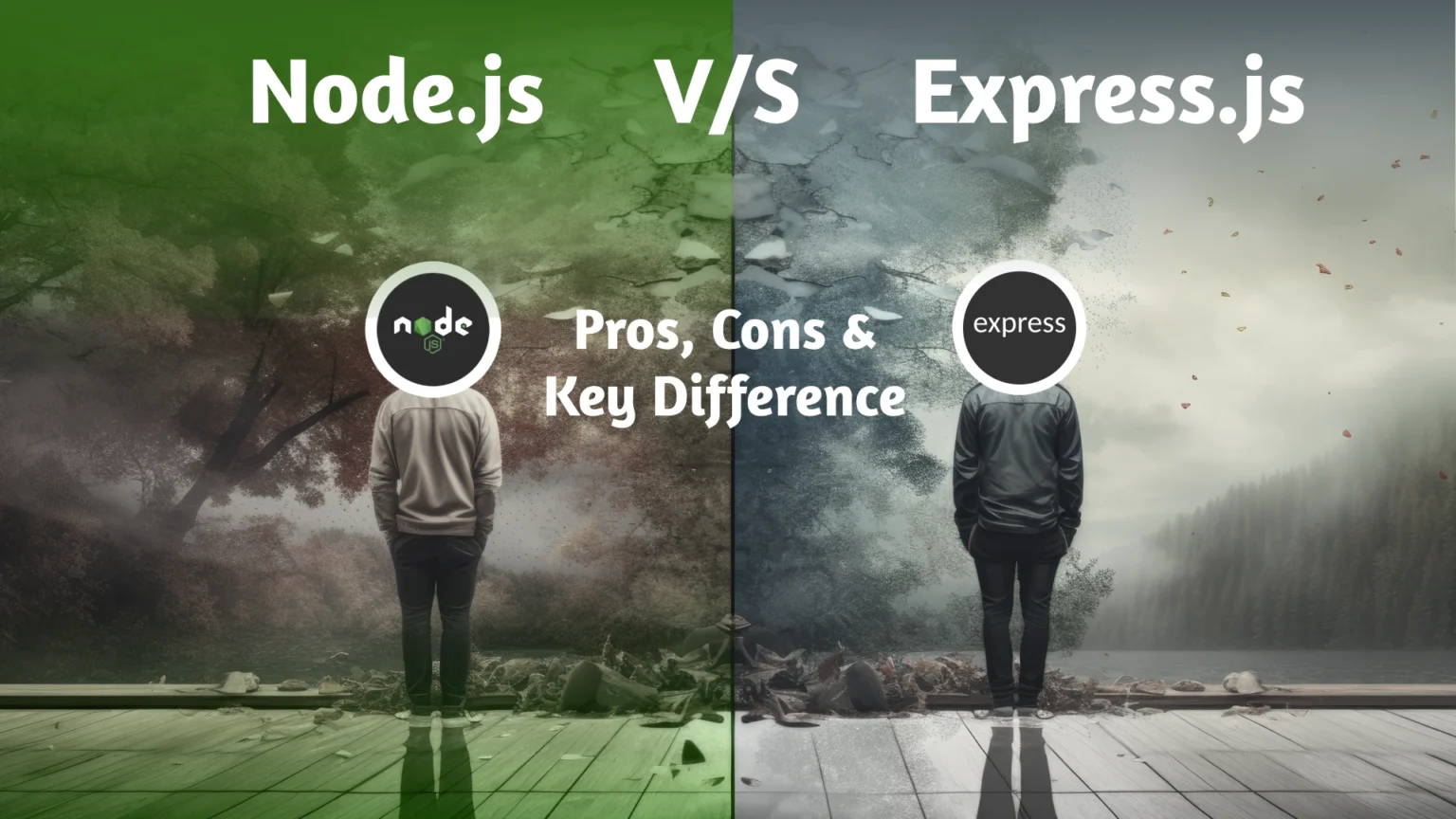Modern web development benefits from Node.js and Express.js as these technological tools became two leading solutions for creating server-side applications with scalability and efficiency features. Active development on servers using Node.js sensors developers to execute JavaScript code at runtime for quick performance with asynchronous input/output handling. Users seeking API development or web application creation find Express.js beneficial because it functions on Node.js to offer lightweight web framework functionality that provides basic yet effective options.
Express.js continues to be among the most popular Node.js frameworks since developers access its 15 million weekly downloads and Node.js achieves 2.1 billion total downloads through NPM trends. Node.js functions as the runtime environment and Express.js exists as an environment framework that adopts Node.js for its foundation despite some confusion about their enemy relationship.
Web applications must start with the proper selection of a backend framework. Results from Stack Overflow show that Node.js is the preferred choice for developers who value its speed and adaptability since 51.4% of developers selected it. The correct decision matters greatly because it directly affects the overall performance together with the scalability and development pace of an application; therefore, developers need to grasp these frameworks’ basic distinct characteristics.
What is Node.js?
Runtime environment Node.js functions as an open-source JavaScript platform designed for browser-free JavaScript program execution. Network applications that scale efficiently benefit from Node.js because it uses the V8 engine from Google Chrome together with its asynchronous, event-driven architecture.
Key Features and Capabilities
- Non-blocking Input/Output functions allow the system to manage multiple queries simultaneously, which leads to enhanced system performance.
- The event loop-based architecture in single-threaded operation delivers high efficiency for applications that deal with large data volumes.
- Fast execution: Powered by the V8 engine, Node.js executes JavaScript code at high speed.
Also Read: Features of Node.js
Common Use Cases
- The server supports real-time functionality through its applications, which include chats as well as gaming servers alongside collaborative tools.
- RESTful APIs provide access to interact with databases and services.
- The streaming application performs efficient management of substantial data flows.
Example: A simple Node.js script
const http = require(‘http’);
const server = http.createServer((req, res) => {
res.end(‘Hello, Node.js!’);
});
server.listen(3000, () => console.log(‘Server running on port 3000’));
Succinct comprehension of Node.js and Express.js fundamentals enables a clueful assessment of Express.js vs Node.js matchups and distinctions between backend Express.js and Node.js implementations.
What is Express.js?
Express.js works as the minimalist fast and flexible web framework available for Node.js development. Through its user-friendly interface, Express.js enables developers to create web applications as well as APIs in an efficient and simplified manner. The Node.js web development community recognizes Express.js as their default standard because it delivers both control and simplicity during development.
Key Features and Capabilities
- The capability to process requests and responses with middleware functions exists within this solution through middleware support.
- Routing: This simplifies URL handling with clean, modular routing.
- The implementation of RESTful APIs through the framework generates API endpoints using basic code writing.
- Template engines: Supports various engines like Pug, EJS, and Handlebars for dynamic content.
Why is Express.js popular for web development?
- Express.js provides a straightforward setup due to its streamlined, lightweight architectural design.
- The framework provides high flexibility because developers can implement only essential features.
- A wide range of ecosystems is possible through the extensive middleware and plug-in products that accelerate development processes.
- Strong community support becomes evident through the large number of weekly downloads exceeding 15 million.
Example: A basic Express.js server
const express = require(‘express’);
const app = express();
app.get(‘/’, (req, res) => {
res.send(‘Hello, Express.js!’);
});
app. listen(3000, () => console.log(‘Server running on port 3000’));
When Node.js works with Express.js, it forms a robust backend infrastructure. The ability to distinguish Express.js from Node.js enables developers to make appropriate decisions about building scalable software applications.
Key Differences Between Express.js and Node.js
| Aspect | Node.js | Express.js |
| Conceptual Difference | An execution environment of JavaScript operates beyond browser compartments. | This web framework exists as a minimalist approach that uses Node.js as its foundation. |
| Ease of Use | Creating a server demands additional code along with configuration requirements. | Designing applications becomes simpler as the language provides integrated functionalities through its simplified programming syntax. |
| Routing & Middleware | The implementation of built-in routing and middleware functions must be handled manually in this framework. | Development periods decrease using the strong routing and complete middleware assistance features. |
| Performance | Faster for basic operations due to fewer abstractions. | Slightly slower but more efficient for complex apps due to streamlined processes. |
| Scalability | Suitable for microservices and basic applications. | Large-scale applications benefit the most from this server because it handles complex routing alongside middleware requirements. |
| Flexibility & Customization | The system offers complete access to modify server operations directly. | Fundamental modules of this solution can be structured yet adaptable through its flexible components. |
Pros and Cons of Node.js
Pros
- High Performance with V8 Engine: The V8 engine built into Node.js stems from Google Chrome and generates machine code from JavaScript to produce faster execution speeds and better performance results.
- Asynchronous, Event-Driven Model: Through its non-blocking system, Node.js operates various requests together at once which proves useful in high-performance applications for chat programs and online games.
- Large Ecosystem with npm Packages: Node.js delivers a large collection of npm packages totaling over 2.1 million which enhances development speed and lowers the necessity to create original code.
- Cross-Platform Compatibility: Node.js operates on Windows, macOS and Linux systems to enable developers a smooth experience when deploying applications across various platforms.
Cons
- Callback Hell & Complexity: Luckily, Node.js uses callback functions, which create complex and difficult-to-maintain code structures inside large applications.
- Not Ideal for CPU-Intensive Tasks: The Node.js runtime platform performs exceptionally well in events involving a large volume of input/output operations, but it encounters challenges when undertaking tasks that require heavy CPU processing capacity.
- Heavy Reliance on Third-Party Modules: Business applications that utilize Node.js typically need external npm packages that result in security risks while producing unstable performance levels.
Knowledge of all benefits and drawbacks helps users decide between Node and Express or choose between Express.js and Node.js. Also, Node.js allows rapid applications with scalable properties, but users must manage its asynchronous operation requirements.
Pros and Cons of Express.js
Pros
- Lightweight and Minimalistic: The lightweight Express.js application delivers swift processing because it contains only necessary features that benefit developers who work on small to medium-sized projects.
- Simplifies Server-Side Development: Express.js enables developers to implement request-response methods and routing aspects as pre-built functions that minimize necessary boilerplate code compared to Node.js.
- Easy Routing and Middleware Support: Express.js features an advanced routing mechanism together with third-party middleware capabilities that make the development of RESTful APIs and difficult web applications simpler.
- Large Community and Extensive Documentation: Since it receives over 15 million weekly downloads Express.js operates within an active community that provides broad support alongside extensive libraries as well as documentation resources.
Cons
- Lacks Built-in Security Features: Express.js lacks native security features aside from basic authentication and data protection functionalities, which need manual addition by developers.
- Middleware Dependency Increases Complexity: Heavy utilization of third-party middleware tools generates unpredictable behavior problems that affect applications with extensive size.
- Not Ideal for Large Monolithic Applications: Using Express.js for microservices development works effectively, yet this framework usually encounters challenges when implementing monolithic applications due to its unstated structural design.
The server-side development of Node.js receives enhancement through Express.js because it simplifies operational tasks. Users must manage both the middleware requirements and security concerns despite Express.js being a beneficial addon for Node.js server development.
When to Use Node.js vs Express.js?
Use Node.js Alone If:
- You require a server solution that combines basic infrastructure and maximum speed with decreased abstraction.
- Your goal is to operate manually in all backend architectural phases, request management, routing tasks, and response handling.
- Your application needs CPU performance intensity and server interaction at a fundamental operational level.
Use Express.js If:
- Your project demands RETS API development alongside web application requirements that need routed structures together with support for middleware.
- A framework is essential to develop applications since it reduces unnecessary code while improving developer productivity.
- Your project requires regular API communication alongside several request handlers since Express.js makes the process easier to handle.
The main difference emerges between Node vs Express while analyzing Express.js vs Node.js or comparing Express.js and Node.js because of distinct functional distinctions. The Node.js framework works best for building custom server environments yet Express.js accelerates complete web application development by supplying structure mechanisms and middleware capabilities. The combination of Express.js and Node.js creates a suitable framework for outputting most backend projects that offer optimized flexibility and performance.
Performance Comparison: Express.js vs Node.js
Benchmarks & Real-World Examples
The number of abstractions in Express.js decreases the system speed while Node.js maintains superior raw performance. Benchmarks demonstrate that raw Node.js technology supports above 70,000 requests per second, whereas Express.js handles between 15,000 to 30,000 requests per second. The additional middleware operations from Express.js result in reduced performance speed but improve application efficiency for advanced projects.
The use of Node.js stands apart from Express.js when developing lightweight applications although Express.js proves more popular among developers for complete web applications because of its robust routing features and middleware capabilities.
How Middleware Affects Response Time
Express.js processes requests through middleware functions, thus adding time to request response rates. The framework becomes more universally applicable because of this design yet suffers some slowdown compared to basic Node.js. The implementation of middleware produces better code maintainability and cuts down on repeated code sections.
Performance Optimizations
- Redis and Memcached should be used as caching solutions to minimize repetitive operations.
- The installation of extra middleware should be minimized to lower response time.
- You should optimize speed through HTTP/2 with compression technology.
- The system requires a load-balancing implementation to achieve performance scalability.
The raw speed of Node.js contrasts with Express.js because this framework offers efficiency and structure that fits bigger applications even though it leads to a slight performance output reduction.
Popular Companies Using Express.js & Node.js
Notable Companies & Projects Built with Node.js
- The server-side processing operations at Netflix benefit from Node.js technology due to its fast lightweight and scalable nature thus decreasing startup times by 70%.
- The Node.js migration at LinkedIn enabled the company to boost server performance twentyfold while cutting down server utilization.
- The ride-matching system of Uber runs on Node.js because it handles real-time operations for its data-heavy architecture.
- The adoption of Node.js at PayPal led to both quicker page responses by 35% and a better developmental process.
Major Apps That Use Express.js
- Accuweather implements Express.js to run its weather API backend successfully when facing large request loads.
- IBM adopts Express.js together with Node.js to deliver cloud services that maintain flexible and elastic solutions for its clients.
- Users of Yummly benefit from Express.js maintaining its API backend to deliver API-driven data quickly and reliably.
- Fox Sports develops real-time content delivery systems by utilizing Express.js as its main framework.
High-traffic applications depend on Node vs Express because these technologies demonstrate efficient and scalable operations that support large-scale frameworks along with Express.js and Node.js.
Final Verdict: Which One Should You Choose?
Summary of Key Takeaways
- Node.js serves as a runtime environment to run JavaScript without the browser giving developers both high-level performance and full authority over server-side system design.
- Express.js serves as a web framework built from Node.js which provides developers with routing capabilities as well as middleware and API support for easier development process.
- The basic operation speed belongs to Node.js, but Express.js provides enhanced application efficiency with its built-in components.
Recommendations Based on Project Type
- Use Node.js independently for creating specific minimalistic servers without dependencies while working on microservices applications and programs that demand high CPU performance.
- Develop RESTful APIs, web applications, or projects with superior routing and middleware through Express.js in conjunction with Node.js.
- Large applications require Express.js because of its modular structure but Node.js stands as the best choice when focusing on basic and performance-heavy projects.
Project requirements for complexity and scalability, together with developer speed, determine whether you should choose Node or Express or Express.js with Node.js. Express.js in combination with Node.js functions optimally for the majority of Internet application requirements.
How Infowind Can Help You?
Custom Node.js & Express.js Development – Scalable and High-Performance Solutions
Our company Infowind maintains expertise in developing scalable applications along with high-performance solutions through our implementation of Node.js and Express.js. The skilled developers at our company develop business-specific backend solutions that guarantee both reliability and efficiency.
API Development & Integration – Secure and Efficient RESTful APIs
Our team builds secure RESTful APIs through the implementation of Express.js alongside Node.js to enhance data exchange functionality. Our APIs feature optimized performance that allows smooth connection with external partner services.
Application speed gets accelerated through Performance Optimization measures
Struggling with slow applications? Programming team members speed up Node.js performance by establishing caching techniques together with load balancing methods while applying middleware optimizations through Express.js. Programming optimizations make your applications execute without interruptions even when they encounter heavy system usage.
Enterprise-Grade Solutions – Tailored for All Business Sizes
We provide custom Node.js and Express.js solutions which represent secure high-scalability solutions that support business growth for startups as well as large-scale enterprises.
Consultation & Support – Expert Guidance for the Right Tech Stack
Users face a dilemma regarding Node.js usage for development compared to Node.js with Express.js. The experts at our firm offer complete consultation to assist you in selecting appropriate tech stack solutions. Our team gives you ongoing assistance to maintain efficiency and update your applications.
Partner with Infowind to leverage the power of Node.js and Express.js for building robust, scalable, and high-performing applications.
Conclusion
Node.js and Express present different benefits when considered in a comparison between these technologies. Node.js delivers top-level system performance with scalable functionality and flexible capabilities that are suitable for fast lightweight server development and applications demanding large amounts of computer processing power. Using Express.js, developers can accelerate development thanks to its pre-built routing capabilities and middleware assistance, and fast API processing, which makes the platform suitable for creating expandable web applications and RESTful APIs.
Differentiating between Node.js and its framework Express.js becomes crucial when picking the most suitable backend implementation stack. Users choosing Node.js by itself can achieve maximum control together with rapid speed performance. Express.js together with Node.js provides a superior solution for faster development along with scalable backend architecture while maintaining peak efficiency.
Want to learn more? The top aspects of Node.js are explained in detail in this article, along with additional resources about Node.js’ suitability for backend web development. This guide explains Node.js applications in web development, and you can find our leading Node.js development company, Infowind, on our website.
Infowind invites partners to develop high-performance scalable applications that use Node.js and Express.js frameworks.






